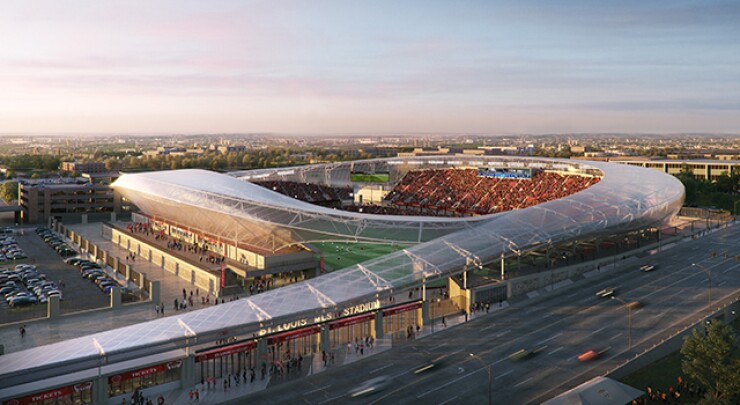CHICAGO – Midwestern voters loosened their purse strings to approve Kansas City, Missouri's $800 million infrastructure referendum but held fast against St. Louis' public financing request for a new soccer stadium.
Voters faced more than $2 billion in borrowing requests Tuesday in Illinois, Missouri, and Wisconsin. Voters approved more than they rejected.

Kansas City voters blessed the city's request to issue $800 million of general obligation bonds in $40 million annual increments over 20 years to fund infrastructure work.
The GO authority supported by an increase in property taxes will allow the city to make critical infrastructure improvements of a range of city assets, said finance director Randall Landes. Current spending can't "keep up with the infrastructure deficit that is accruing," Landes said.
The referendum was divided into three questions and each required a 'yes' vote of at least 57.1% of voters. The first asked for $600 million to repair streets, bridges, sidewalks, and trails with $150 million going to create a sidewalk repair program that eliminates the homeowner assessment.
The second question sought approval for $150 million to improve flood control to prevent floodwaters from backing up into properties. The third question asked for $50 million to repair public buildings including upgrades to meet standards under the Americans With Disabilities Act.
The bond measures won the endorsement of labor, the Greater Kansas City Chamber of Commerce, Civic Council of Greater Kansas City, and several neighborhood organizations. Freedom Inc., an African-American political club, opposed the bonding because of its reliance on a prolonged property tax increase.
Also in the Kansas City area, 10 school districts sought bond referendums with just one failing to win the supermajority vote of 57.1% needed. The largest, from Park Hill schools for $110 million to finance construction of new schools, won 84% of the vote. All totaled, voters in the area approved more than $200 million of borrowing.
In St. Louis, voters approved the city's request to raise its sales tax by a half cent to generate $20 million annually to fund infrastructure projects, workforce development, public safety initiatives, and a light-rail expansion of its MetroLink system.
The sales tax hike triggers an increase in the city's business use tax. The city wanted to use that new revenue to fund the stadium but voter approval was needed. Voters shot down by a 46% to 53% margin the stadium request.
The failed bid cast doubt on the city's chances that the city will win a Major League Soccer franchise.
"For many years we have believed that St. Louis would be a tremendous market for a Major League Soccer team, but the lack of a positive stadium vote is clearly a significant setback for the city's expansion opportunity and a loss for the community," MLS said in a statement.
The league had warned recently that passage of the referendum was important to winning an expansion franchise and the private investor group SC STL has said it doesn't have an alternative financing plan.
Elsewhere in Missouri, Springfield voters rejected their school district's $189 million bond request. A majority approved, but the vote fell short of the supermajority needed. The borrowing was being sought to support a 12-year $367 million master facilities plan.
Voters in the Rockwood district approved a $95.5 million bond request, St. Charles voters signed off on $47 million and Normandy approved $23 million for borrowing.
St. Louis elected its first female mayor to replace incumbent Mayor Francis Slay, who did not seek another term. The victor -- Lyda Krewson – has been a city alderman since 1997 and she had Slay's endorsement.
In Ferguson, Mayor James Knowles III won another term in the first election since the controversial August 2014 fatal shooting of Michael Brown, an African-American, by a white police officer.
The shooting led to violent local protests and a federal probe. The city lost its investment grade rating over the fiscal strains of dealing with the aftermath and federal mandates.
In Illinois, more than two dozen school districts, towns, and fire protection, forest preserve, and levee districts sought nearly $600 million in borrowing for maintenance work, upgrades, and new projects, according to Ipreo's election calendar.
Voters approved 19 of the requests totaling about $300 million and rejected nine totaling about $275 million, according to Ipreo data.
The largest measure -- Wheaton-Warrenville Community School District's CUSD 200's $132.5 million request – was shot down by voters. The measure sought to finance projects throughout the suburban Chicago district would have required a property tax hike to support a $154.5 billion capital program.
Far west of Chicago, Kane County voters approved their forest preserve district's request to borrow $50 million to acquire more land and finance improvements to existing preserves.
In Wisconsin, voters faced 29 bond questions from 20 districts totaling nearly $700 million. Voters approved 16 requests for $500 million and rejected 13 totaling more than $200 million, according to data provided by the Wisconsin Taxpayers Alliance.
The largest of the crowd – a $180 million bonding request from the Verona Area School District –won approval. The borrowing which requires a tax hike would finance new schools to address overcrowding and a swimming pool.





